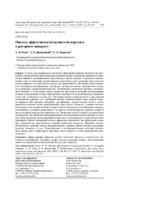Оценка эффективности процессов переноса в роторном аппарате

Date
2021Publisher
Another Title
Evaluation of the Efficiency of Transfer Processes in a Rotary Apparatus
Bibliographic entry
Волк, А. М. Оценка эффективности процессов переноса в роторном аппарате = Evaluation of the Efficiency of Transfer Processes in a Rotary Apparatus / А. М. Волк, А. И. Вилькоцкий, О. Н. Пыжкова // Энергетика. Известия высших учебных заведений и энергетических объединений СНГ. – 2021. – № 5. – С. 459-474.
Abstract
В статье рассматривается возможность применения вихревых аппаратов для межфазного взаимодействия при проведении различных физико-химических процессов в химической, пищевой, газодобывающей, строительной и других отраслях. В процессах массопередачи один или несколько распределяемых компонентов через активную поверхность их раздела переходят из одной фазы в другую. Для эффективного выполнения данных процессов в абсорберах, ректификаторах, адсорберах, экстракторах важное значение имеет развитая поверхность взаимодействующих фаз. Большинство химических реакций в реакционных аппаратах и гетерогенных средах происходят при подводе исходных распределяемых веществ в зону реакции и отводе образующихся продуктов из зоны химического взаимодействия через поверхность раздела фаз. Указанные процессы используются и при решении экологических проблем: для санитарной очистки вентиляционных газов, мокрой очистки выбросов. При выпарке, абсорбции, ректификации, мокрой очистке газов и других процессах актуальна задача предотвращения уноса капель жидкости с газовым потоком. Рассмотрена одна из конструкций роторного многоступенчатого массообменного аппарата, позволяющего достигать равномерного по высоте тонкодисперсного распыла жидкости при восходящем перекрестном движении газа. Приведены схемы установок для выполнения эксперимента. На основании экспериментальных исследований получена зависимость среднего диаметра капель диспергированной жидкости от геометрических и гидродинамических параметров. Описан дисперсный состав и приведены зависимости для определения основных характеристик, используемых в физико-химических процессах. Выполнен теоретический расчет движения частиц дисперсной фазы в рабочем объеме аппарата при разных расходах жидкости и газа. Теоретическими и экспериментальным методами произведена оценка уноса жидкой фазы, выполнен анализ процесса и даны практические рекомендации.
Abstract in another language
This paper considers the possibility of using vortex devices for interphase interaction while carrying out various physical and chemical processes in the chemical, food, gas production, construction and other industries. In the processes of mass transfer, one or several distributed components perform the transition from one phase to another through the active surface of their interface. To perform the implementation of these processes in absorbers, rectifiers, adsorbers, extractors effectively, the developed surface of the interacting phases acquire s a particular significance. Most of the chemical reactions in reaction devices and heterogeneous media occur when the initial distributed substances are supplied to the reaction zone and when the resulting products are removed from the chemical interaction zone through the phase interface. The processes under consideration are also used in solving environmental problems, viz. for sanitary cleaning of ventilation gases, wet cleaning of emissions. During evaporation, absorption, rectification, wet cleaning of gases and other processes, the problem of preventing the entrainment of liquid droplets with the gas flow is of great importance. One of the designs of a rotary multistage mass transfer apparatus is considered which makes it possible to achieve a finely dispersed liquid spray, uniform in height, with an ascending cross-flow of gas. The diagrams of installations for carrying out the experiment are given. On the basis of experimental studies, the dependence of the average diameter of dispersed liquid droplets on the geometric and hydrodynamic parameters has been obtained. The dispersed composition is described and dependences are given for determining the main characteristics used in physicochemical processes. The theoretical calculation of the movement of particles of the dispersed phase in the working volume of the apparatus at different flow rates of liquid and gas has been carried out. Theoretical and experimental methods were used to estimate the carryover of the liquid phase, an analysis of the process was carried out, and practical recommendations were given.
View/
Collections
- № 5[7]
